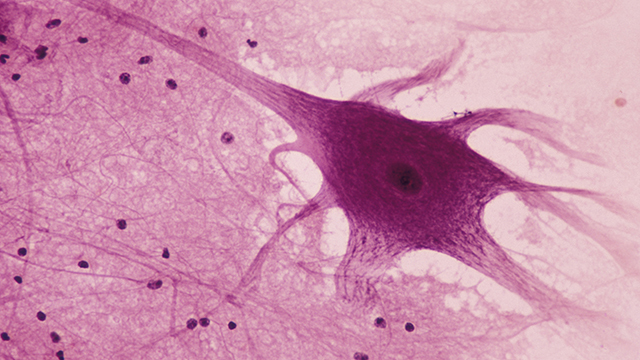NIH Grant Promises New Frontier in Neural and Organ Regeneration
July 13, 2022 - Todd AckermanHouston Methodist has received a National Institutes of Health (NIH) training grant for a first-of-its-kind program to bridge the gap between neuroscience and organ systems and speed development of next-generation neuroregeneration therapies.
The T32 grant, awarded to Houston Methodist Neurological Institute's Department of Neurosurgery in May, should usher in a new wave of research exploring the little-studied connection between the brain and the vascular, gastrointestinal, musculoskeletal and immune systems.
"This training program will foster a new generation of scientists who will in turn help build a new frontier of biology," says Philip Horner, a Houston Methodist professor of neuroregeneration and the project leader. "It will bring non-neuroscience disciplines into neuroscience."
Horner calls the grant the culmination of the program's establishment, which dates to a 2016 Houston Methodist course. The course, expanded upon since then, typically fills up within 24 hours of being announced, Horner says.
A Texas Medical Center collaboration
Known as Neural Control of Degeneration and Regeneration (NeuralCODR), the program unites 30 regeneration biologists and neurophysiologists and 12 clinical researchers, providing mentorship to fellows pursuing expertise in the new frontier. Besides Houston Methodist, team members also come from Rice University, MD Anderson Cancer Center, Baylor College of Medicine and the University of Houston.
The program is born from the idea that medicine's organization of departments by organ systems creates silos that impede collaboration and training. Hence, "understanding of how the central nervous system communicates with end organs through the body is in its infancy," according to the project abstract on NIH Reporter.
The classic example of a neurological condition caused by dysfunction in another organ is hepatic encephalopathy, where advanced liver disease can lead to cognitive impairment, such as confusion and difficulty processing thoughts. It occurs when the liver struggles to filter toxins from the blood, which subsequently build up and travel to the brain.
But Horner notes that many connections between the brain and other organs still are theorized only. Researchers have yet to map the connections anatomically or even find the chemical signals between the brain and many different organ systems.
NeuralCODR cross-disciplinary projects
Examples of NeuralCODR research already underway include:
- The use of direct spinal stimulation devices, in development, to treat bladder problems resulting from aging or injury. The idea is to reconnect the brain with the circuitry necessary to control the bladder.
- Fecal transplants to improve gut-brain signaling and decrease inflammation in patients who have suffered head injuries. The transplant research, currently in animals, builds on a human study that found concussions in college athletes could be diagnosed through changes detected in their gut microbiomes.
- The development of a method to use nanometer-scale vehicles to deliver medicine to neural cells that promotes the regeneration needed to reverse or repair ongoing damage in conditions ranging from neurodegenerative disease and stroke to brain trauma. The research uses non-neural cells to promote new connections and encapsulated asteroids that can be implanted to support synapse growth in models of disease.
"The thing to remember is that brain and body communication is a two-street that regulates vitality and decline," says Horner, also scientific director of the Center for Neuroregeneration at Houston Methodist. "But those communication patterns between mind and body that make us sick or well are still mysterious. We need to unravel those mysteries."
The bottom line, says Horner, is that curing many brain disorders will require a better understanding of organs downstream of the brain.
A model for other institutions
Horner expects the program to inspire other institutions — he says many already are interested in developing similar efforts — given that cross-fertilization between neuroscience and organ systems is rare throughout medicine. One institution, described by an NIH official as the other leading pioneer in the field, already plans to visit Houston Methodist in 2023 to observe the program's early progress.
The NIH T32 grant awarded to ouston Methodist Neurological Institute's Department of Neurosurgery, $1.5 million over five years, will pay the salaries of four fellows per year, still to be chosen. The NeuralCODR training program was initially seeded with two fellows per year through the generosity of the Paula and Joseph C. 'Rusty' Walter III Neurorestoration Initiative.
Through future renewable grants, Horner hopes to expand the program in future years to 16 positions.
T32 grants are prestigious, highly competitive grants given to institutions to support groups of pre- and/or post-doctoral fellows, including trainees in basic, clinical and behavioral research. The NIH annually awards about 20 such grants in the neurosciences.
The grant is the first T32 ever awarded to Houston Methodist.
"This is a landmark for the Houston Methodist Neurological Institute's Department of Neurosurgery to be recognized by the NIH as a top site for training," says Dr. Gavin Britz, director of the Neurological Institute. "It will help us achieve our goal of attracting and training the best researchers."


